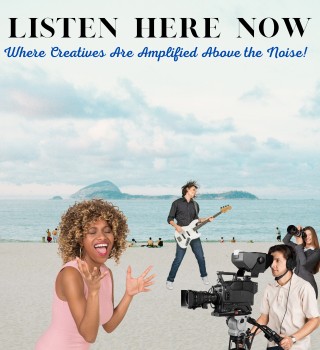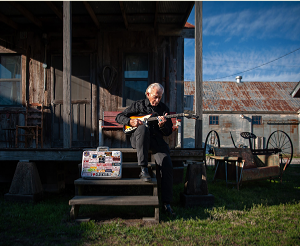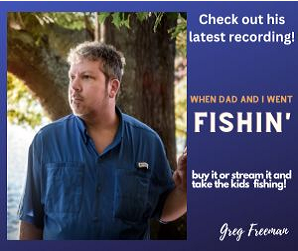Charlie Musselwhite Teams Up with Blind Boys of Alabama for Select Dates
Grammy Award-winning blues artist and harmonica-playing sensation Charlie Musselwhite is no stranger to the Blind Boys of Alabama, the gospel group that has been performing in one configuration or another for over half a century, amassing its own share of Grammy and Dove awards, including the Lifetime Achievement Award from the Recording Academy. Musselwhite and the Blind Boys worked together over two decades ago on the group's Grammy-winning album, Spirit of the Century (2001), and their respect for each other has only deepened.
It comes as no surprise that Musselwhite and the Blind Boys have found themselves sharing the stage on various occasions, including recent Fall 2022 concert dates with more dates to come in early 2023. It also comes as no surprise that both have received 2023 Grammy nominations - Musselwhite for Best Traditional Blues Album for Mississippi Son (2022), the Blind Boys for Best Americana Performance for "The Message" featuring Black Violin.
Rory Doyle Photography, Cleveland, Mississippi, USA
Musselwhite and the Blind Boys recently played some dates in the Northeastern United States, performing in Ridgefield, Connecticut on November 10, Orono, Maine on November 12 and Portsmouth, New Hampshire on November 13. As Musselwhite recently chatted about his upbringing and musical career via telephone from his hotel room, just hours prior to his performance in Maine, one could sense his great admiration for the Blind Boys and quickly conclude that their initial meeting was heaven sent.
"Maybe It Was Memphis"
To explore how Charlie Musselwhite found himself on tour with the Blind Boys of Alabama for select dates in the Northeast, one must take a trip back in time to a city that has spawned legends in multiple genres, most notably Elvis Presley. Though he was born in Kosciusko, Mississippi, Charlie Musselwhite spent his formative years in Memphis. Musselwhite says, "There was a lot of music there. There was a lot of gospel, country and rockabilly and jazz. I like jazz," but he confirms that he was particularly influenced by blues musicians. "Blues," he explains, "sounded like how I felt. I was the only child of a single mom. I was a lonely kid."
Commercially successful artists and records that sell, as everyone knows, do not always have a lot of substance or genuine emotion, or "meat on the bones," as some might put it, which probably explains why Musselwhite found solace in the blues. "There was more to blues than just being another kind of music. It really resonated with how I looked at life and how I felt," Musselwhite says. The young blues fan collected records by his favorite artists, and he especially enjoyed various country blues artists. "As I got older, I got to meet some of the local guys who played blues." Reflecting on those performers busking on Beale Street and other Memphis locales, Musselwhite admits, "There were street musicians who would play for tips, and I was fascinated by those guys. Some of them might have been famous, but I was too shy to talk to them."
Nonetheless, Musselwhite eventually met and became hugely influenced by Furry Lewis and Will Shade, the former a country blues guitarist, the latter a blues artist who was particularly adept at playing the harmonica. "I had no idea I was preparing for a career," Musselwhite insists. "These men were flattered that I would seek them out. If I'd known I would have a career in this music, I would have paid a lot more attention."
In the beginning, Musselwhite says his harmonica playing was self-taught. Given that the harmonica is the only instrument that you breathe in and out of, it is difficult to watch other musicians and learn, as one might do so where the guitar, drums or even piano are concerned. Musselwhite says, however, that he picked up things from Will Shade.
"Sweet Home Chicago"
From Memphis, Musselwhite went to Chicago, seeking better opportunities, namely a factory job with steady pay and benefits. This was a path that so many from the American South, both whites and African Americans, had taken before, and many more would follow. In Chicago, he learned of blues clubs and says, "I'd request tunes. They just thought I was a fan. No people my age were going to those clubs. And there were hardly any white people."
It was during this time that Musselwhite got to know blues legend Muddy Waters and others. At Pepper's Lounge, a blues joint established in 1956 by Johnny Peppers on Chicago's South Side, Musselwhite's direction changed, he says, "when musicians heard me play for Muddy Waters."
"Good-time Charlie?"
Since those days of performing with Muddy Waters and so many other venerated blues musicians, Charlie Musselwhite has been a sought after musician. He has been a guest performer on multiple noteworthy records, including Bonnie Raitt's Grammy Award-winning Longing in Their Hearts (1994) album. For the 1998 Blues Brothers 2000 film, Musselwhite appeared as part of the Louisiana Gator Boys alongside B. B. King, Eric Clapton, Bo Diddley, KoKo Taylor, Jimmy Vaughan, Dr. John and Jack DeJohnette. And he has collaborated with various recording artists from different genres to the delight of fans, even winning a Grammy for Get Up! (2013), a collaboration with Ben Harper.
When put on the spot to name a favorite collaborative artist or record on which he has played, Musselwhite naturally hesitates. He insists he has had a great time working with different artists on projects of diverse sounds, but he acknowledges that he "really enjoyed working with Mavis [Staples]." Laughing, he says, "She calls me her boyfriend and calls my wife her sister wife."
Musselwhite also praises Cyndi Lauper, who recorded her Grammy-nominated Memphis Blues (2010) record in Memphis with a crew of Memphis-based session musicians. The project debuted at number 26 on the Billboard Top 200 albums and number one on the Billboard Blues Albums chart. In 2014, Lauper and Musselwhite were part of In Performance at the White House: Memphis Soul, performing for President and Mrs. Barack Obama and other distinguished guests. The program, which aired on PBS television, also included Mavis Staples, Justin Timberlake, William Bell, Queen Latifah, Alabama Shakes and Booker T. Jones.
Mesmerized by Lauper's musicianship, Musselwhite recalls, "One time, we were gonna go to Japan. The Japanese sent her a tune, and we were to come up with the arrangement." Musselwhite and his fellow band mates worked on the song, coming up with something they felt good about. When Lauper heard it, she remarked that it was good, but suggested it needed a bit of work. "In about ten minutes," Musselwhite says, "she rearranged the tune, and it was amazing. She's quite a gal."
To explore how Charlie Musselwhite found himself on tour with the Blind Boys of Alabama for select dates in the Northeast, one must take a trip back in time to a city that has spawned legends in multiple genres, most notably Elvis Presley. Though he was born in Kosciusko, Mississippi, Charlie Musselwhite spent his formative years in Memphis. Musselwhite says, "There was a lot of music there. There was a lot of gospel, country and rockabilly and jazz. I like jazz," but he confirms that he was particularly influenced by blues musicians. "Blues," he explains, "sounded like how I felt. I was the only child of a single mom. I was a lonely kid."
Commercially successful artists and records that sell, as everyone knows, do not always have a lot of substance or genuine emotion, or "meat on the bones," as some might put it, which probably explains why Musselwhite found solace in the blues. "There was more to blues than just being another kind of music. It really resonated with how I looked at life and how I felt," Musselwhite says. The young blues fan collected records by his favorite artists, and he especially enjoyed various country blues artists. "As I got older, I got to meet some of the local guys who played blues." Reflecting on those performers busking on Beale Street and other Memphis locales, Musselwhite admits, "There were street musicians who would play for tips, and I was fascinated by those guys. Some of them might have been famous, but I was too shy to talk to them."
Nonetheless, Musselwhite eventually met and became hugely influenced by Furry Lewis and Will Shade, the former a country blues guitarist, the latter a blues artist who was particularly adept at playing the harmonica. "I had no idea I was preparing for a career," Musselwhite insists. "These men were flattered that I would seek them out. If I'd known I would have a career in this music, I would have paid a lot more attention."
In the beginning, Musselwhite says his harmonica playing was self-taught. Given that the harmonica is the only instrument that you breathe in and out of, it is difficult to watch other musicians and learn, as one might do so where the guitar, drums or even piano are concerned. Musselwhite says, however, that he picked up things from Will Shade.
"Sweet Home Chicago"
From Memphis, Musselwhite went to Chicago, seeking better opportunities, namely a factory job with steady pay and benefits. This was a path that so many from the American South, both whites and African Americans, had taken before, and many more would follow. In Chicago, he learned of blues clubs and says, "I'd request tunes. They just thought I was a fan. No people my age were going to those clubs. And there were hardly any white people."
It was during this time that Musselwhite got to know blues legend Muddy Waters and others. At Pepper's Lounge, a blues joint established in 1956 by Johnny Peppers on Chicago's South Side, Musselwhite's direction changed, he says, "when musicians heard me play for Muddy Waters."
"Good-time Charlie?"
Since those days of performing with Muddy Waters and so many other venerated blues musicians, Charlie Musselwhite has been a sought after musician. He has been a guest performer on multiple noteworthy records, including Bonnie Raitt's Grammy Award-winning Longing in Their Hearts (1994) album. For the 1998 Blues Brothers 2000 film, Musselwhite appeared as part of the Louisiana Gator Boys alongside B. B. King, Eric Clapton, Bo Diddley, KoKo Taylor, Jimmy Vaughan, Dr. John and Jack DeJohnette. And he has collaborated with various recording artists from different genres to the delight of fans, even winning a Grammy for Get Up! (2013), a collaboration with Ben Harper.
When put on the spot to name a favorite collaborative artist or record on which he has played, Musselwhite naturally hesitates. He insists he has had a great time working with different artists on projects of diverse sounds, but he acknowledges that he "really enjoyed working with Mavis [Staples]." Laughing, he says, "She calls me her boyfriend and calls my wife her sister wife."
Musselwhite also praises Cyndi Lauper, who recorded her Grammy-nominated Memphis Blues (2010) record in Memphis with a crew of Memphis-based session musicians. The project debuted at number 26 on the Billboard Top 200 albums and number one on the Billboard Blues Albums chart. In 2014, Lauper and Musselwhite were part of In Performance at the White House: Memphis Soul, performing for President and Mrs. Barack Obama and other distinguished guests. The program, which aired on PBS television, also included Mavis Staples, Justin Timberlake, William Bell, Queen Latifah, Alabama Shakes and Booker T. Jones.
Mesmerized by Lauper's musicianship, Musselwhite recalls, "One time, we were gonna go to Japan. The Japanese sent her a tune, and we were to come up with the arrangement." Musselwhite and his fellow band mates worked on the song, coming up with something they felt good about. When Lauper heard it, she remarked that it was good, but suggested it needed a bit of work. "In about ten minutes," Musselwhite says, "she rearranged the tune, and it was amazing. She's quite a gal."
"Blind Faith"
As for his longstanding friendship with the Blind Boys of Alabama, Charlie Musselwhite suggests his first encounter with the group was more than just a chance meeting. "I met the Blind Boys in 2005 at a Christmas party at the home of a very wealthy man in San Francisco," Musselwhite says. "My mother had just been murdered, and it was real moving for me." Choking up momentarily before continuing, he shares that the group and the guys' sincerity and gospel message were comforting. "It was important to me. I love their music. It's from the heart, nothing shallow, just moving music. To me, it comes from the same place deep inside as blues. It was a real healing time, to be performing with them."
As the interview came to a close, Musselwhite was put on the spot once more and asked if there's an artist with whom he would like to perform, one with whom he he has yet to collaborate. He replied, "If they were all here, there would be many. I'd love to play with Charley Patton." Musselwhite says, "I couldn't name one person or group, but I really enjoy working with the Blind Boys of Alabama."
The conversation concluded with thoughts about the power of music and the influence musicians can have, which puts emphasis on making the message a positive one. Musselwhite concurred, adding, "I quit drinking 35 years ago. I always try to help people find a way out of that situation, if I can."
While music trends are ever-changing, Ricky McKinnie of the Blind Boys of Alabama says, "The gospel and blues still got a groove." Charlie Musselwhite, acknowledges the relevance of blues music by saying, "Blues is more than music. It's your buddy when you're up, your comfort when you're down."
McKinnie, Ricky. Telephone conversation with Greg Freeman. 15 November 2022
Musselwhite, Charlie. Telephone conversation with Greg Freeman. 12 November 2022
Special thanks to Ricky McKinnie of the Blind Boys of Alabama for arranging interview with Charlie Musselwhite!
18 November 2022. By Greg Freeman. ListenHereNow.com
As for his longstanding friendship with the Blind Boys of Alabama, Charlie Musselwhite suggests his first encounter with the group was more than just a chance meeting. "I met the Blind Boys in 2005 at a Christmas party at the home of a very wealthy man in San Francisco," Musselwhite says. "My mother had just been murdered, and it was real moving for me." Choking up momentarily before continuing, he shares that the group and the guys' sincerity and gospel message were comforting. "It was important to me. I love their music. It's from the heart, nothing shallow, just moving music. To me, it comes from the same place deep inside as blues. It was a real healing time, to be performing with them."
As the interview came to a close, Musselwhite was put on the spot once more and asked if there's an artist with whom he would like to perform, one with whom he he has yet to collaborate. He replied, "If they were all here, there would be many. I'd love to play with Charley Patton." Musselwhite says, "I couldn't name one person or group, but I really enjoy working with the Blind Boys of Alabama."
The conversation concluded with thoughts about the power of music and the influence musicians can have, which puts emphasis on making the message a positive one. Musselwhite concurred, adding, "I quit drinking 35 years ago. I always try to help people find a way out of that situation, if I can."
While music trends are ever-changing, Ricky McKinnie of the Blind Boys of Alabama says, "The gospel and blues still got a groove." Charlie Musselwhite, acknowledges the relevance of blues music by saying, "Blues is more than music. It's your buddy when you're up, your comfort when you're down."
McKinnie, Ricky. Telephone conversation with Greg Freeman. 15 November 2022
Musselwhite, Charlie. Telephone conversation with Greg Freeman. 12 November 2022
Special thanks to Ricky McKinnie of the Blind Boys of Alabama for arranging interview with Charlie Musselwhite!
18 November 2022. By Greg Freeman. ListenHereNow.com
Connect with ListenHereNow.com publisher and editor Greg Freeman on social media!
ListenHereNow.com publisher Greg Freeman is an author, editor, recording artist, songwriter, amateur visual artist and lifelong horse lover, as well as an avid gardener and daffodil hybridist, judge and exhibitor.
The Greg Freeman Media portfolio of digital publications includes sites devoted to the American South, gardening, horse breeding and so much more!

Copyright 2022 - 2026



